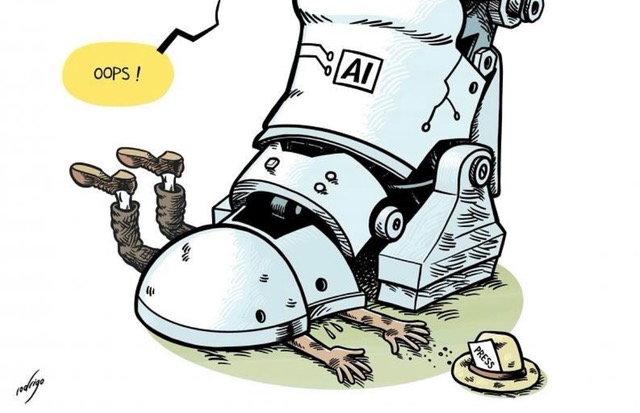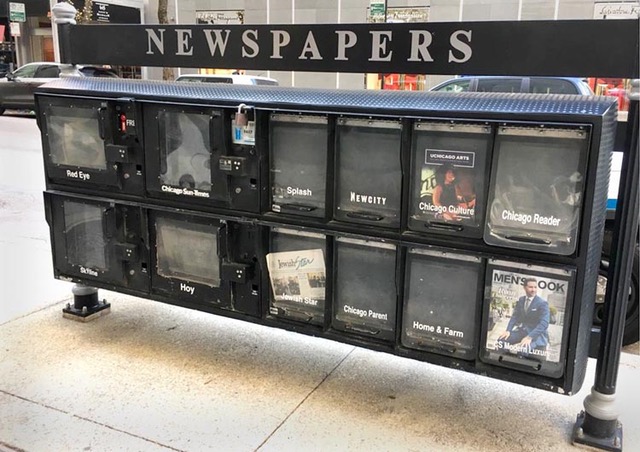Amidst the quiet streets of small-town America and under the relentless pulse of digital advancement, our democracy faces an unseen peril—a threat not mounted from the podiums of polarized politics but from the channels that have historically fortified public discourse and accountability. Traditional media, once a stalwart institution, is gasping for breath in an ocean of real-time digital content, and the very cornerstone of our democracy—information—is on unstable ground.
The State of Local News 2023 by Northwestern Medill’s Local News Initiative reports that “the number of local news outlets continued to contract at an even steeper rate in 2023. On the current trajectory, by the end of next year, the country will have lost a third of its newspapers since 2005. Discouragingly, the growth in alternative local news sources — digital and ethnic news outlets, as well as public broadcasting — has not kept pace with what’s being lost.”
“As a result, most communities that lose a local newspaper — usually a weekly — do not get a replacement. Those communities are typically poorer and without access to high-speed broadband that would connect them with other reliable news sources in their region, state, and nation.”
As newspapers dwindle to relics and local newsrooms become ghost towns, we stand on the precipice of a silent crisis. Where once the newspaper was king, commanding the morning routines of millions and setting the agenda for the day’s discussions, we now encounter an unprecedented void. America’s democracy thrives on diversity of thought, the clash of opinions, and rigorous journalism that dares to challenge the echelons of power. But as print fades and social media algorithms dictate the whimsical narratives of our times, the grounds for a sincerely informed electorate evaporate. Newspaper columnists and editorials matter.

“Alternative” papers struggle to maintain the fraying edges of investigative and local journalism, clinging to a romanticized past when journalists were foot soldiers of truth. In the clamor for survival and relevance, however, even these bastions of independent thought have succumbed to the siren calls of populism and sensationalism.
In this new landscape, everyone with access to a smartphone professes to be a journalist—every snapshot, story, and tweet breaking news. The lines blurred between crafted fiction and journalistic integrity, staged spectacle and grounded reporting. In such a realm—where the narrative tapestry is woven thread by thread by unvetted sources—how does one distinguish fact from fabrication? How does one distinguish storytelling from journalism? The crime story prevails.

Trust in journalism, a currency once spent liberally by the public, is now in short supply. As skepticism grows, so too does the vulnerability of our civic structures. A polity devoid of a reliable news anchor is adrift, susceptible to the currents of misinformation and manipulation. The news has become more marketing than news. Starbucks has a new coffee. Disney has a new ride.
Yet, it is not all dirge and descent. Even as traditional media contracts, opportunities for revitalization and innovation abound. The digital domain, the very disruptor of the old order, holds the light to guide journalism forward. Artificial Intelligence, often seen as an additional threat to journalistic jobs and veracity, carries the untapped potential for supporting and elevating data-driven journalism, investigative algorithms, and machine learning to decipher complex issues for a wider audience.

The question is how to harness digital transformation to serve the public good without compromising journalistic values. Can digital platforms—derided for their role in the decay of attention spans—become flag-bearers for nuanced, in-depth reportage? Social networks, once platforms for personal interactions, are now the primary news source for many; how do we instate mechanisms for accountability and substantiation within these spaces as we become more robotic and operate remotely?
The answers may lie in a bold reimagining of media structures, a democratized and decentralized approach that fosters independent journalism at the community level, supported by a nexus of national and international networks to maintain the rigor and scope.
Moreover, the public’s role cannot be understated. Audiences must grow warier and more demanding—citizens capable of discerning quality content and willing to invest time or resources into supporting journalism that enriches the democratic process. A cultural shift towards valuing truth over trivia, context over chaos, is indispensable. Authenticity is key.

As we stand at this crossroads, it’s essential to remember the actual cost of losing ground in the fight for comprehensive journalism. Without it, we risk moments of ignorance or misconception and the gradual erosion of our democracy itself. Each piece of misplaced news priority—for instance, the fascination over a celebrity’s itinerary over pressing societal issues—is a subtle, yet potent, undermining of our civic dialogue.
America’s insatiable appetite for the next viral sensation must not cannibalize the insightful analysis, the critical narratives, and the vigilant oversight that define a free and healthy society. For every empty headline that captures the day’s fleeting curiosity, we sacrifice a piece of our democratic integrity, unknowingly bartering the essence of the informed citizenry for the hollow gratification of entertainment. How important is it what time Taylor Swift‘s private plane lands in Las Vegas for the Superbowl Game? News for whom? Recently, Chicago TV stations covered a rat impression laid in concrete in Rogers Park for a week. Why?
Ultimately, we must ask ourselves: is this the future we desire for our nation? Diminished newspapers and unchecked digital giants are not merely a change in media consumption habits; they are harbingers of a world in which the very framework of our democratic discourse is at risk. It is up to us—consumers, creators, custodians of the fourth estate—to ensure that it is not the clangor of the sensational but the pursuit of truth that wins the day.






